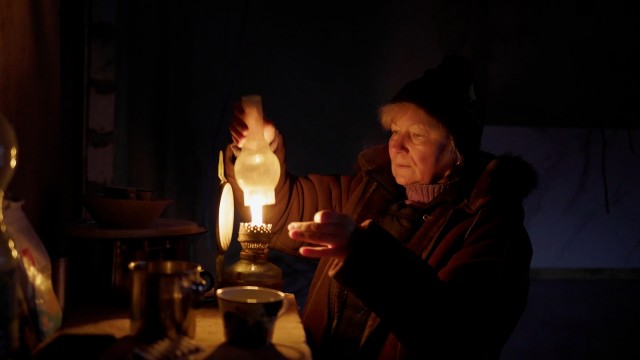In the early hours of February 24th 2022, Russia launched a full-scale military invasion of Ukraine, sparking a war that would displace millions and kill thousands. As the conflict continues to rage on, alongside the stories of death and destruction that have poured out of the region, we’ve also seen an abundance of tales paying testament to the spirit of the Ukrainian people. From the joyous scenes of relieved celebration following the liberation of Kherson to an engaged couple asking for donations towards an off-road vehicle (for the father of the bride-to-be’s army unit) for a wedding gift, the country’s resilient population has repeatedly shown a life-affirming togetherness throughout a troubled period. Adding to the stories of hope coming out of the Ukraine is Anton Shtuka’s Guardian docs short film The Year That Never Ended – the portrait of a young comedian and his friendship with the woman whose house he is helping rebuild.
Featuring a traditional documentary approach, in terms of production, Shtuka’s documentary initially intrigues with the insight it provides into the war-torn country, but it captivates its audience and keeps them hooked through its charming characters Vasyl Baidak – a young, wild-haired comedian from Kyiv – and Iryna Terekhova – a retiree living in a farming village in the Chernihiv region. This “odd couple” probably would have never met if it wasn’t for Baidak coming to help build Terekhova a new home (her house was destroyed in March 2022), but their bond is unmistakable on screen.
“We witnessed a deep cultural connection of these two different worlds”
“It was an encounter between fashionable young people from the big city and locals from a small village”, Shtuka explains as we discuss his reaction to see the building crew and the residents together for the first time. “The young people were vegans, progressives and socially minded. The villagers were old fashioned people who had lived more than half their lives in the Soviet Union. For me, they were also two worlds of parents and kids. At the same time, these people were connecting and this connection of two worlds impressed me a lot! And it wasn’t just because of the dramatic circumstances: We witnessed a deep cultural connection of these two different worlds.”
Coming together to rebuild Terekhova’s home, an event the young builders called ‘Toloka’ after the old Ukrainian tradition where villagers would gather together to help someone repair a house or raise a barn, you can tell this isn’t just a one-off altruistic act from the Kyivians, there’s something in it for them as well – a sense of identity. Not that I’m implying that’s something they didn’t have before, as the Ukrainian population seem a very passionate and proud people, but in the wake of recent events this sense of national pride appears galvanised. Baidak and his fellow builders a prime example of this reinvigorated spirit.

Not only did retiree Iryna Terekhova have her house destroyed, the only place she had to stay was in her basement, which she shared with the invading Russian soldiers.
They also seem to be having fun. Don’t get me wrong, there’s some heartbreaking moments in The Year That Never Ended, with Terekhova’s tale of sharing her basement with Russian soldiers the most memorable, but Baidak and his friends aren’t just there to help construct buildings, they also seem intent on bringing life and laughter back to the region. As the comedian cracks jokes about building an “800 floor mall” and the project’s unofficial boss reveals how he learnt his construction skills from YouTube and TikTok, there’s an infectious sense of community permeating the film that will restore a little of that faith that you’ve probably lost in humanity in recent times.
For director and fellow Ukrainian Shtuka, he hopes that his film will help international audiences to “really understand Ukrainians better”, especially “how brave and creative they have shown themselves to be since the war escalated”. At the same time, as a filmmaker with a platform, he also understands his responsibility to capture the true experience of the conflict and highlight the “brutality of Russia’s crimes”. With that in mind, he thinks his audience “ought to feel the difference between these two nations”, as Vasyl puts it: “While Russia destroys, we create”.

 Rob Munday
Rob Munday